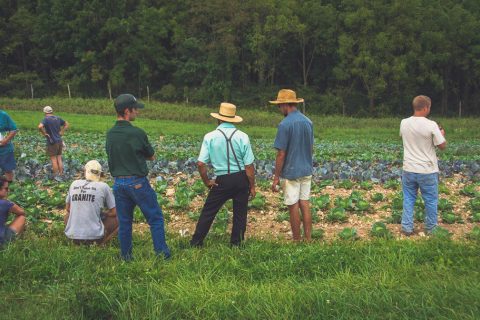Inspections
PCO must conduct an initial on-site inspection of each operation for which certification is requested. An on-site inspection will take place annually thereafter. The purpose of the annual inspection is to determine if your Organic System Plan (OSP) is accurate, complete, and verifiable.
All on-site inspection must be conducted when an authorized representative of the operation who is knowledgeable about the operation is present and at a time when land, facilities, and activities that demonstrate the operation’s compliance with or capability to comply with the applicable provisions of 7 CR Part 205, subpart C can be observed, except that is requirement does not apply to unannounced on-site inspections.
Unannounced Inspections
The National Organic Program requires PCO to perform unannounced inspections on an annual basis from a minimum of five percent of the operations it certifies. The operations selected for unannounced inspections each year will be distributed across all scopes and will be weighted based on the percent of operations that PCO certifies to that scope. PCO may conduct an unannounced inspection of an operation in the following situations which include but are not limited to:
- to investigate a complaint
- to investigate an identified risk to organic integrity (may include previous non-compliance issues, organic and non-organic handling, risk of contamination from adjoining land use, or complexity of an operation)
- random
- when directed to do so by the Administrator
- any other situation deemed necessary to determine compliance
Unannounced inspection may be limited in scope, depth, and breadth, and may cover only certain aspects of the operation, such as specific fields, facilities, or products.
Residue Testing
The National Organic Program requires that PCO conduct periodic residue testing of agricultural products on an annual basis from a minimum of five percent of the operations it certifies. PCO may require pre-harvest or post-harvest sampling to test for the presence of prohibited substance or use of excluded methods including but not limited to contamination by heavy metals, herbicides, pesticides, hydrocarbons, genetically modified organisms, hormones, and antibiotics. Samples may include the collection and testing of soil; water; waste; seeds; plant tissue; and processed product samples. Cost directly associated with sample collection and testing shall be covered by PCO.
PCO may conduct sample collection and residue testing on an operation in the following situations, which include but are not limited to:
- Random selection
- When directed to do so by the Administrator
- When it is suspected that a prohibited substance has been applied or has been produced using excluded methods
- To investigate a complaint, the practices of a certified operation or an applicant for certification
- To investigate an identified risk to organic integrity
- Any other situation deemed necessary to determine compliance
The certification program director will determine if and when residue testing is required and arrangements will be made for a qualified inspector to obtain a sample of materials in question and forward to a qualified laboratory. Chemical analysis must be made in accordance with the methods described in the most current edition of the Official Methods of Analysis of the AOAC International or other current applicable validated methodology determining the presence of contaminants in agricultural products.
Results of all analyses and tests performed under this section:
- Must be promptly provided to the Administrator; except, that, where a state organic program exists, all test results and analyses shall be provided to the state organic program’s governing state official by the applicable certifying party that requested testing; and
- Will be available for public access, unless the testing is part of an ongoing compliance investigation; and
- Will be provided to the certified operation.
If the test results indicate a specific agricultural product contains pesticide residues or environmental contaminants that exceed the Food and Drug Administration’s or the Environmental Protection Agency’s regulatory tolerances, PCO must promptly report such data to the Federal health agency whose regulatory tolerance or action level has been exceeded.
Inspection Resources
PCO is here to support you with any questions you may have on preparing for your inspection. Please contact the PCO office for any questions pertaining to your operation. In addition, you may download "Preparing for an Organic Inspection: Steps and Checklists" by ATTRA here


Interested in Performing Organic Inspections?
Learn more about becoming an organic inspector for PCO by hitting the button below
